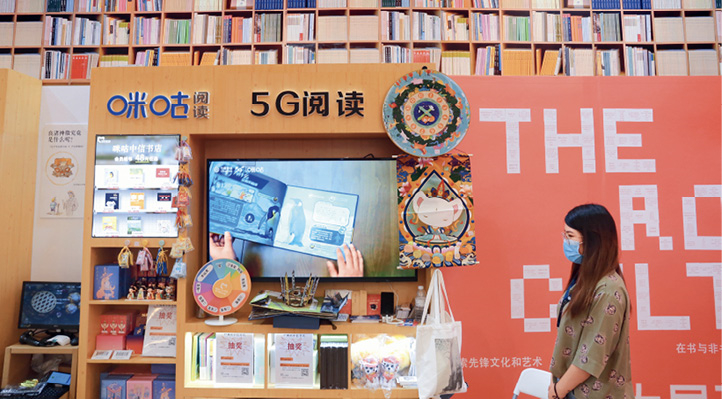
Readers are reading at the Taohuayuan Library in Jiangyong County, Yongzhou City of South China’s Hunan Province on January 22, 2022.
As China pursues digitization, book lovers are reaping its harvest. Besides buying books from physical stores or borrowing them from libraries, more and more readers are now accessing books and other reading materials via digital devices: e-books, apps, audio books, and other technological innovations.
On April 23, the 28th World Book Day, China’s premier online seller JD.com released a report, “2023 Online Book Consumption Observation,” which says compared to paper books, Chinese readers are regarding e-books and audiobooks as more convenient and these have a higher reading/usage frequency.
For instance, readers read paper books 35.8 times a month, while e-books are read 50.2 times and audiobooks listened to 40.9 times. Only 22.4 percent of the respondents said they read paper books for over an hour at a time, while 35.4 percent of them said the same thing about e-books and 32.2 percent for audio books.
Lu Yaqing is a dedicated reader who reads for an hour every day before going to bed. When her eyesight weakened, she turned to audiobooks. She listens to them through an app on her mobile phone and as a bonus, the accompanying music makes her feel relaxed and fall asleep quickly. She decides how long she would “read” and the app stops at the preset time, when she is fast asleep. She says audiobooks give her a sense of intellectual fulfilment, compared to watching short videos.
Audio books have given a new lease of life to classics. After finishing the audio version of A Dream of Red Mansions, recognized as one of China’s greatest novels written in mid-18th century, she has now started listening to Jane Eyre, the 19th-century British classic by Charlotte Bronte. The reading revolution has opened the door to a new world for her.
Now in China, the days of purchasing books from a store or borrowing them from the library are gone, digitization is the new path and right one: since all the technologies around us have evolved, why not reading?
Who Are the Main Digital Readers?
The report “2023 Online Book Consumption Observation” shows that compared to paper books, more convenient e-books and audiobooks have a higher reading/usage frequency.
The Gen Z was born in the digital age. They have grown up with the Internet and prefer reading on electronic devices. Online reading gives them more convenient and faster access to information.
The change in the national reading habit is driving the book industry towards online, digital, and intelligent transformation, and digital reading has become a mainstream way of reading.
Women constitutes the main force for the book market, according to the JD.com report. They consume 53 percent of online books, which is six percentage points higher than men’s consumption tally. Their reading topics are also different. Male consumers are more interested in such subjects as financial investment, computers, and the Internet. Women, on the other hand, prefer books related to family, education, and art, with a higher preference for children’s books, fashion, and music books.
Cao Yanfei is a mother of two. The majority of books she bought in the past year are picture books for her six-year-old son and four-year-old daughter.
“Before I got married, all the books I bought or read online were for my career advancement, but now, my needs have changed. I prefer e-books, interactive ones with images, videos, and links for users to interact with. There are multiple tools to mark the passages you like and leave a note, which can be read by others using the same app,” she said.
Cao adds that e-books have emerged as the perfect alternative for her family as they are “interesting, convenient, and interactive.”
In the digital age, women are interested in books which can help enhance their self-worth and independence. Biographies of strong women such as former U.S. First Lady Michelle Obama, Hollywood icon Audrey Hepburn, and Chinese writer Yang Jiang are popular among women readers, as well as books on exercising, makeup, and personal relations. Many bookstores give the most prominent display to books on topics that are of interest to women, as a tribute to their clout in the market.

China Mobile’s Migu Reading brings attention to its 5G online reading and VR reading at the Shanghai Book Fair with the theme of “Love Reading, Love Life,” on August 12, 2020. The era of 5G reading has penetrated into the lives of ordinary readers.
New Challenges for Bookstores
Liu Yifan, a staff at the Xinhua Bookstore in Beijing, told China Today that in the past, reading was a private affair. But today the reading environment has totally changed.
“Today, you can read and write using various formats such as paper, audios, and videos. Writers and readers can interact more easily online with readers participating more and more in a writer’s creation. Sometimes they even influence authors’ writing styles or the plot and ending of a novel. The connections between books and readers are far beyond our imagination.”
Therefore it’s a challenge for bookstores to survive in the digital age. Liu said as the sale of physical books has decreased, they are thinking up more innovative methods to attract readers. Besides online selling, live streaming has become the norm for book promotions, which is more effective than traditional marketing methods such as book signing.
However, when all is said and done, brick-and-mortar bookstores are still irreplaceable. “Readers not only want fast and high-quality online services, but also an immersive offline experience. Over 30 percent of parents take their children to a bookstore once every one to three months. In the new era, bookstores also provide cultural services centered around books, creating a cultural atmosphere for readers young and old,” Liu observed. 
